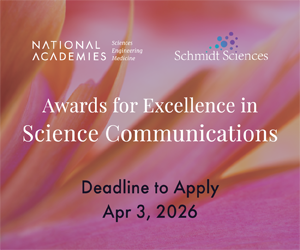“Flavor is a concept created in the brain,” said White House pastry chef Bill Yosses. His audience was not at the executive mansion, but about one mile away in a flavorful session on 19 February at the 2011 AAAS meeting in Washington, D.C.
Our perception of flavor, said Yosses, arises when our brain integrates three different senses: smell, taste, and touch. Changing any of the three changes flavor.
Yosses spoke in a symposium titled "The Science of Eating: Perception and Preference of Human Taste," which drew about 200 people at the Walter E. Washington Convention Center. Four speakers treated the crowd to a sensory exploration of flavor.
To demonstrate the importance of smell, Jane Leland, research principal at Kraft Global Foods in Glenview, Illinois, passed out yellow jelly beans. “You really can't tell the flavor with your nose pinched,” she said, instructing the audience to eat the jelly beans doing just that. Smells get to the nose through two different pathways, from direct sniffing and from food in the mouth that releases aromas traveling back to the nose. Pinching your nose closes off both pathways.
Without smell, the jelly beans, which were either lemon or pineapple, indeed tasted exactly the same—just sweet and sour.
Sweet and sour are two of the five classic tastes. The others are salty, bitter and umami, which comes from the Japanese for savoriness. Specialized receptors on the tongue distinguish among the tastes. Contrary to popular belief, different zones of the tongue do not correlate to different tastes, said Leland. Rather, receptors for all five tastes are spread evenly on the tongue.
However, different people do prefer different foods—a distinction that could partly be genetic, said Gary Beauchamp, director of the Monell Chemical Senses Center in Philadelphia. Beauchamp cited a chemical called phenylthiocarbamide (PTC), which is related to compounds that make foods like broccoli and beer bitter. PTC tastes extremely bitter to some people but not others.
The ability to taste phenylthiocarbamide is encoded by a single gene, Beauchamp noted. “We can take cheek swabs from everyone in this room and predict with near 100% accuracy whether you will find it bitter or not,” he said.
Taste preference also depends on diet, Beauchamp added. For example, people who switch to lower salt diets begin to prefer less salty foods—a finding with important medical implications due to the health risks of high sodium intake.
The White House's Yosses also picked up on the theme of healthy eating. He focused on food texture: how the sense of touch impacts flavor. Understanding the science of manipulating food texture can lead to healthier items that are no less flavorful—even desserts, Yosses said.
Chocolate mousse, traditionally made with egg yolks and cream, “gives us terrific mouthfeel, suave and unctuous, but it also is causing damage to your arteries,” he said. Instead, Yosses applies some basic principles of chemistry and physics to make a mousse from only chocolate, water, and gelatin, but with the same satisfying texture of the full-fat version.
Speakers also noted that food is a natural ambassador for conveying science to the public. Chemist Kent Kirschenbaum of New York University co-founded the Experimental Cuisine Collective, which runs workshops with scientists and chefs such as Ferran Adriá of the 3-star Michelin restaurant elBulli in Spain. Both Adriá and Yosse lectured at a Harvard University course in fall 2010 on the Science of Cooking: From Haute Cuisine to Soft Matter Science.
As that title suggests, food allows science to transcend the borders of biology, chemistry, and physics—a pathway to broader appeal. After all, as Kirschenbaum stated, “We all eat.”
Sarah Zhang is a science writer based in Cambridge, Massachusetts. In May, she will graduate from Harvard University with a bachelor's degree in neurobiology. She previously wrote about the Science of Cooking course for Harvard Magazine. Reach her at sarahzhang@sarzha.com.



